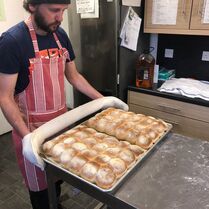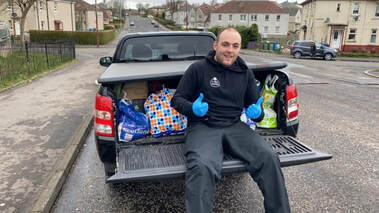|
Like many people I have found looking back to the beginning of March to be a very interesting, if slightly unsettling, exercise. How little we knew of what the coming months had in store for us. How so much of what now seems so settled and taken for granted was up in the air; lockdown, furlough schemes, the huge role something called zoom was about to play in our lives, and the reliance of a fairly substantial portion of our population on the emergency charitable provision of food to get by. I remember discussing with my colleagues at St Paul’s Youth Forum contingency plans to set up food deliveries to support the people who would usually attend our community meals during lockdown. Normally we run three weekly free community meals from our base in Blackhill in the North East of Glasgow. These meals served an important social function in the community, being the only local place where families could get together for a nutritious sit down meal, while also addressing food poverty in our area, acting as an informal referral-free food bank, open for anyone to use and take what they wished. At the time, no one knew the scale of the crisis we were heading into but we felt that it was important to continue to support those who had come to rely on our services throughout this difficult period. My initial expectations, naively, were fairly low. I thought that we would maybe get 30 or so of the many people who regularly attended our community meals needing our help during lockdown. Instead we have been supporting, through emergency food deliveries, well over 250 people every week since April. This has been in line with what most organisations have seen, with food bank use up by almost 250% over the lockdown period according to IFAN data and many organisations adapting themselves to meet this new need in the community by providing emergency food. The nimbleness and creativity with which the third sector and community organisations have been able to adapt and respond to this crisis has been phenomenal. It is something I have been extremely proud of and impressed by, and something which I believe goes to the heart of our strength. Whilst national and local government-wide schemes take weeks to roll out and prepare, and are often placed in the hands of large corporate bodies with little understanding of the areas and people they work with, our embeddedness within communities enables us to quickly identify and support many vulnerable people. Our position in the community as a place where people know they can go for help and be treated with dignity and respect, has made us the first port of call for many.
Despite all this, there is a lot about the reliance on third sector and food bank resources for emergency aid that leaves many community food workers uneasy. During this time, there has been important discussions amongst us as a sector on how to best respond to this crisis whilst pushing forward to a better future. In our discussions, we identified many concerns, including three points below. Firstly, nationwide the coverage of third sector organisations is patchy and fairly arbitrary, there is no national grid work, no system in place to ensure that every community has a local hub, and whilst some communities can have several charities and food banks, others equally needing have none. Many of the Youth Workers at St Paul’s, who have selflessly taken on delivering emergency food during this crisis, on top of their normal roles supporting our young people digitally 6 nights a week, still don’t know if they will have secure funding in place for their jobs at the end of Summer. The result of this confused and largely short-term funding landscape is that as a sector we differ vastly in our capacity, approaches, and capabilities. Whilst there is no serious oversight of the sector to ensure community groups are supported to deliver what is becoming an increasingly relied upon essential service in a way that is safe and reduces the risk of transmission. We were fortunate in St Paul’s to already have a large kitchen and open space to work in, as well as a solid, dedicated team of paid staff and a work vehicle. All this has allowed us to run an emergency food delivery service that complies with social distancing, safety and hygiene measures. However, I know of other organisations who are not so well equipped, who are reliant heavily on volunteers and donations, and have to face the agonising decision of closing up shop knowing people rely on their services to get through the week or remain open worrying that they are a potential hub of infection. Secondly, most would agree that in principle, people should have the ability to choose and purchase their own food, and whilst the Scottish government espouses a cash first approach to food poverty we have found as food workers that in reality financial aid simply isn’t readily available to most people we support. Which isn’t particularly surprising - if we had a proper cash based system in place, most wouldn’t be coming to food banks for help in the first place. Furthermore, as so much of our food system has been left in the hands of the market for so long, predicated mainly on the assumption of a car-owning, tech savvy, financially secure consumer, there are huge gaps in local food provision in our communities. Meaning that even with money there are large barriers to accessing food for many. ‘Food Deserts’, like Blackhill, have nowhere within reasonable distance where people can purchase affordable healthy food, and as many in our community don’t own a car, or have access to online shopping, this has left them stranded during this crisis. One of the main reasons for referral I have been dealing with is people vulnerable to COVID-19 who are terrified of using public transport during this time, but have no other way of accessing an adequate or affordable range of foods. Finally, St Paul’s Youth Forum, like most community organisations was set up to build up our community, to develop social cohesion and pride of place, to work with our young people, to give them opportunities and purpose. We were never set up with the expectation that we would be the last port of call for people going hungry at night. I am enormously proud of the way my colleagues have stepped up to this unprecedented challenge, but can’t help feeling that the fact community groups and food banks have had to play such a vital role in this crisis can only speak to a collective failure in our society. Simply put, people shouldn’t be reliant on the charity of others, or dependent on donated and surplus food, to stop them going hungry at night. This should be a basic civil right. This crisis has highlighted the interconnectedness of society and the vulnerabilities that are brought about to everyone when our food system is unfit for purpose and we lack adequate safety nets. We need to take this as an opportunity to rethink and properly restructure our food and welfare systems. The right to food and a cash based approach to food poverty have long been spoken about as aims of the Scottish government and now, as we look to “build back better”, more than ever they are necessary. I believe that community projects have a huge role to play in our food systems future, but let us move forward so it is through education and empowerment, building community, and developing local food provision, green space, and food hubs, rather than scrambling about trying to plug holes in our broken food and welfare systems. [1] Independent Food Aid Network: June Data Release https://uploads.strikinglycdn.com/files/f6d1ccad-e17e-43b0-908c-450007fec559/Scotland%20breakdown%20for%20IFAN%20data%20release%20June_FINAL.pdf
2 Comments
|
Proudly powered by Weebly




 RSS Feed
RSS Feed